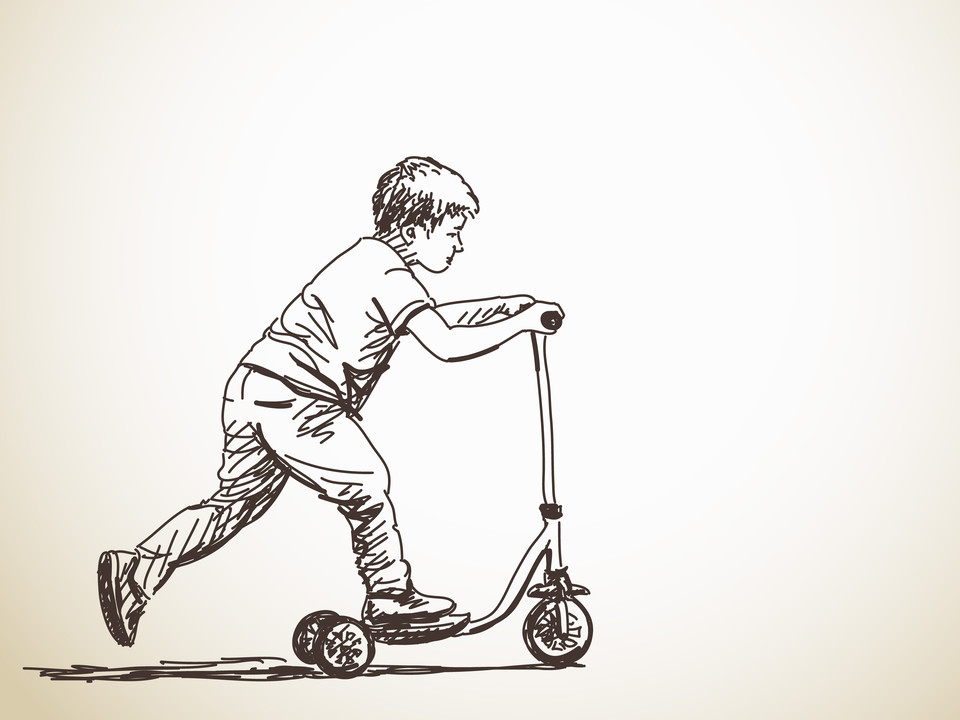
Step by Step: Being told 'no' can be disheartening, but it can also be an act of care.
One of my favourite parts of the day is jogging alongside my kids as they scoot along to school. The rule is they can go fast and do their tricks, but they must stop and wait for me at every crossing. Remarkably, they consistently respect this boundary; which is definitely not the case with most rules I try to put in place!
My son, Jack, aged 7.5, asked me at dinner last week if he was ready to scoot to school alone. "I can do it, mum," he pleaded. Shoot. Here he is demonstrating his independence, courage and vulnerability, but I need to say no. The route isn't safe enough, and he's not old enough.
It's interesting that when a parent or teacher cannot trust a child to do something, it's often seen as an act of care: by deciding we aren't ready to trust them with a particular task we are safeguarding them.
However, as adults, we often experience the withholding of trust as an insult, not an act of protection. I think it's because as adults we find it harder to communicate how we're differentiating our trust; trusting someone to do one thing, but not the other.
With Jack, at that moment, I had 4 options:
1. Say "no way" with zero explanation
2. Put my fears and responsibilities aside and say "yes" (not going to happen)
3. Defer the decision; basically, say yes but not until he's 11
4. Say "no, for now" but explain very clearly why and given him a very clear map of how he can get to a place where I can trust him to safely scoot to school alone.
Jack is a super visual child, and he loves to know precisely how things work. So, we sat down and drew the route to school together and marked every road he'd need to cross. There were 8. We drew a green line for the ones he could already cross safely such as the pedestrian crossing and a red line for the ones that were still quite dangerous, including the slip road where cars fly out and it's tricky to see them coming.
Here's our map:
We had a plan that he seemed happy and confident to conquer! I don't think he really wanted to scoot to alone, quite yet, but he was looking for the path that would help him get ready.
I often make a mess of these tricky parenting situations. However, I think I got this one right because I had seen a similar pattern of behaviour over and over again in the workplace. Employees ask their boss to trust them with something that requires far greater responsibility than they have now. The response they get is often a flavour of 1, 2 and 3:
Nobody maps out the risk. No solutions are given to overcome the uncertainties.
It can be completely deflating, even humiliating.
#TrustWise Tips:
· We often hear about how a lack of trust can be damaging, but sometimes over-trusting can be harmful too. When we consciously decide not to trust someone to do something to protect them, explain precisely why. It can then be experienced as a sign of care vs a signal of distrust.
· If people come to you and ask to take a ‘trust leap' they are not quite ready to make, map out the stepping stones (the equivalent of the road crossings) to reduce the risk enough for them to be prepared.


Teacher at Northern Health School
4yThis is so great and showing this visually to any child under 10 I think is gold. Such an empowering way to validate their want to grow, then to invite them to make an informed choice. So much trust to be gained from validation!
Developing strategic partnerships to fuel the mobile games Industry growth and provide solutions for re-location, education, financial & representation in one of the most innovative & challenging locations on the Planet
4yFantastic share, used exactly the same route working with my twins. Build, share, grow, empower
Just found some implications for my working life... I presume that's a little bit too late for my dad job...
Coach & Psychologist at HumanDynamics
5yThank you for this helpful post. In our family, we play a different "trusting game". When our daughter Sofia (10) requires us to take the "trust leap", SHE has to convince us by explaining WHY we should trust her. She usually wins!
Leading change and growth (one story at a time)
5yHi Rachel, lovely post. I faced a similar situation recently, my son wants to cycle to football practice in the late evenings alone. I must admit to picking option 3. Just like you, yes wasnt an option, however I shall go back and map out the risks and route to him going alone. I guess it boils down to the importance of communication in trust.